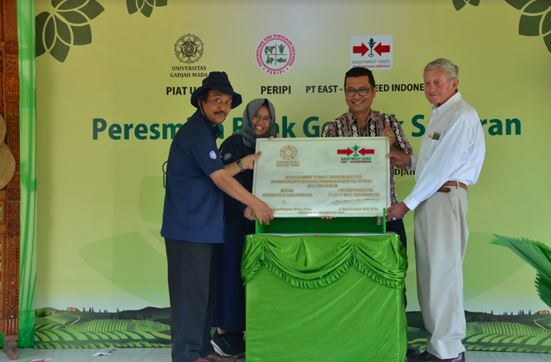Yogyakarta, Indonesia
24 August
The first Indonesian gene bank dedicated to horticultural crops, particularly vegetables, was officially launched through a collaboration between tropical vegetable seed company East-West Seed and Universitas Gadjah Mada (UGM), a public research institution in Yogyakarta.

The gene bank, which will store and preserve genetic resources of various vegetable crops, is located at the Agro Technology Innovation Center of UGM. Present at the inauguration were UGM Vice Rector for Research and Community Service drg. Ika Dewi Ana M. Kes, Ph.D and representatives from East-West Seed including founder and honorary chairman Simon Groot, Managing Director EWINDO Glenn Pardede, Sales and Marketing Director EWINDO Afrizal Gindow, and R&D Director EWINDO Asep Harpenas.
“It is a great honor for us to collaborate with EWINDO to inaugurate the Vegetable Gene Bank in the spirit of Indonesia’s 73rd Independence day, as the realization of our commitment to the sustainability of vegetable genetic resources in Indonesia, not only for purposes of conservation, research and education but ultimately for the benefit of the Indonesian people,” said Gadjah Mada Rector, Prof. Ir. Panut Mulyono, M.Eng., D. Eng.
“We are very proud to collaborate with Gadjah Mada University to help build the infrastructure and to operate the first vegetable gene bank in the country. We hope that this facility will contribute to raising Indonesia’s agricultural productivity by giving scientists wider access to germplasm, which will help plant breeders improve vegetable varieties that farmers will grow,” said EWINDO Managing Director Glenn Pardede.

Why do we need gene banks?
The UN Sustainable Development Goal #2 to End Hunger calls for increased investment in research, technology development and gene banks in order to enhance agricultural productive capacity in developing countries.
Gene banks are critical for preserving biodiversity by safeguarding genetic resources through inventory, collection, conservation and sustainable use of germplasm for plant breeding programs. This supports the growth of the horticulture industry, especially in accelerating the development of new varieties and high quality seeds that will result in increasing farmers’ productivity and income.

Indonesia is a species-rich country, having a vast array of natural ecosystems in more than 17,000 islands positioned between two continents and two oceans. Currently the UGM gene bank holds 62 accessions for pepper, 12 for tomato, 16 for eggplant, 30 for long yard bean, 25 for cucumber, 27 for melon and yellow cucumber, 21 for French bean, also sweet corn and glutinous corn. It is expected to grow more through the voluntary seed contribution of both private and public institutions.
Globally, there are about 1,700 gene banks that meticulously collect and preserve samples of crop varieties and their wild relatives to ensure that the world’s genetic diversity is not lost. The Svalbard Seed Vault in Norway presently holds the largest collection of food crop seeds, with more than 960,000 samples.